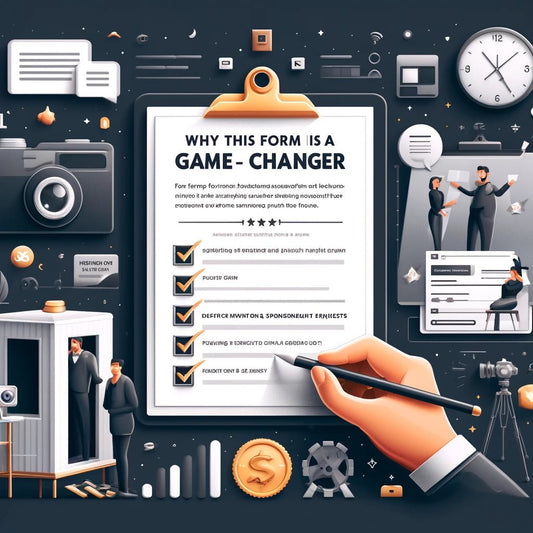
The Best Corporate Event Technology to Enhance Productivity and Engagement
Share
.jpg)
Corporate event technology has become increasingly prevalent in the modern age, revolutionizing the way corporate events are planned, managed, and executed. It encompasses various tools, software, and platforms that are designed to enhance the overall event experience for organizers, attendees, and stakeholders.
The role of technology in corporate events is multifaceted and plays a crucial role in various aspects of the event lifecycle. It helps in enhancing event planning and management by streamlining processes, automating tasks, and providing real-time data and analytics. Furthermore, technology plays a vital role in improving attendee experience and engagement through interactive features, personalized content, and seamless communication channels.
The benefits of using technology in corporate events are abundant. Firstly, it increases efficiency and cost savings by reducing manual labor, optimizing resources, and minimizing errors. Technology enables enhanced communication and collaboration among event stakeholders, allowing for better coordination and seamless information sharing. It facilitates data collection and analysis, providing valuable insights into attendee preferences, event performance, and ROI.
There are several popular types of corporate event technology that organizations can leverage. This includes event management software for comprehensive event planning and organization, mobile apps, and attendee engagement tools for seamless interaction and networking, virtual and hybrid event platforms that enable remote participation, live streaming and webcasting solutions for broadcasting events worldwide, and audience response systems for real-time audience interaction and feedback.
However, implementing corporate event technology requires careful consideration. Factors such as budget and cost analysis, scalability, customizability, technical support, infrastructure, and training and adoption challenges need to be taken into account to ensure successful implementation and utilization of technology.
What is Corporate Event Technology?
Corporate event technology, also known as corporate event tech, pertains to the utilization of a variety of digital tools and platforms to enhance and streamline corporate events. This entails integrating technology, such as event applications, registration systems, live streaming, and interactive presentations, to create captivating and unforgettable experiences for attendees. By incorporating these technologies, corporate event organizers can enjoy numerous benefits, including improved communication, heightened efficiency, and enhanced data analysis. Take event apps, for instance, which provide participants with easy access to schedules, maps, and networking opportunities. The evolution of corporate event technology has paved the way for more interactive and immersive events, leaving an indelible mark on attendees' minds. Here's a fun fact for you: In 2020, virtual and hybrid events witnessed a remarkable growth rate of over 1000%, underscoring the increasingly pivotal role played by corporate event technology.
The Role of Technology in Corporate Events
When it comes to corporate events, technology plays a pivotal role in enhancing the overall experience. In this section, we will explore how technology is revolutionizing event planning, management, and attendee engagement. Discover the latest tools, trends, and techniques that are transforming the way corporate events are organized and executed. From streamlining logistics to creating immersive experiences, technology has truly become an indispensable ally in the world of corporate events.Enhancing Event Planning and Management
Enhancing event planning and management involves leveraging various technologies to streamline processes, improve organization, and ensure smooth execution. Here are some ways in which technology can enhance event planning and management:
- Event Management Software: By utilizing event registration platforms and project management systems, event planners can automate tasks, track progress, and centralize information for efficient coordination.
- Mobile Apps and Attendee Engagement Tools: Mobile apps offer real-time updates, interactive agendas, and networking opportunities, thereby boosting attendee engagement during events.
- Virtual and Hybrid Event Platforms: With virtual and hybrid event platforms, event organizers can plan and execute events that reach a broader audience, providing flexible participation options.
- Live Streaming and Webcasting Solutions: Leveraging live streaming and webcasting technologies enables remote participation, expanding the event's reach to a global audience.
- Audience Response Systems: Implementing audience response systems facilitates interaction and enables the collection of valuable feedback during presentations and sessions.
Pro-tip: For enhanced event planning and management, it is advisable to consider a comprehensive event management software that integrates multiple functions. Such software provides a centralized platform for seamless coordination and execution.
Improving Attendee Experience and Engagement
Improving attendee experience and engagement is of utmost importance in corporate events to create an unforgettable and interactive environment. Here are several ways in which technology can enhance attendee experience:
| 1. Utilizing interactive displays and touchscreens | can effectively provide real-time event updates and personalized information to attendees. |
| 2. The availability of mobile apps | enables attendees to effortlessly access schedules, speaker profiles, and networking opportunities. |
| 3. Encouraging active participation and feedback | through live polling and audience response systems can greatly enhance attendee engagement. |
| 4. Immersive and captivating virtual and augmented reality experiences | offer attendees engaging and interactive content. |
| 5. Social media integration | allows attendees to easily share their experiences and connect with other participants. |
By incorporating these cutting-edge technologies, corporate events can effectively ensure that attendees are fully engaged, enjoy a personalized experience, and leave with a positive and lasting impression of the event.
The Benefits of Using Technology in Corporate Events
Technology has revolutionized the way we plan and execute corporate events, bringing a multitude of benefits to the table. In this section, we'll dive into the advantages of leveraging technology in corporate events, including increased efficiency and cost savings, enhanced communication and collaboration, and the power of data collection and analysis. Get ready to discover how incorporating technology can transform your corporate events into seamless and impactful experiences.Increased Efficiency and Cost Savings
- By incorporating corporate event technology, businesses can experience increased efficiency and achieve cost savings.
- Streamlined event planning and management processes using the right technology can lead to increased efficiency and cost savings.
- Automation of registration and ticketing processes through technology eliminates the need for manual data entry, resulting in increased efficiency and cost savings.
- Integration of communication tools in event technology enables real-time collaboration, leading to increased efficiency and saving costs by eliminating the need for multiple communication platforms.
- The data collection and analysis capabilities provided by event technology contribute to increased efficiency and cost savings by enabling targeted marketing and informed decision-making.
- Virtual and hybrid event platforms offered by technology reduce travel and venue costs while reaching a larger audience, resulting in increased efficiency and significant cost savings.
Leveraging the appropriate corporate event technology allows businesses to optimize operations, enhance productivity, and achieve substantial cost savings.
Enhanced Communication and Collaboration
The Key to Successful Corporate EventsWhen it comes to the success of corporate events, enhanced communication and collaboration play a vital role. By leveraging technology, organizers can greatly improve these aspects, resulting in a more efficient and engaging experience for attendees. Here are some ways in which technology enhances communication and collaboration:
- Real-time messaging: By utilizing platforms like Slack or Microsoft Teams, event organizers, speakers, and participants can instantly communicate with each other.
- Virtual collaboration tools: Video conferencing and collaborative document sharing technologies make it seamless for remote team members to collaborate effectively.
- Event networking apps: Attendee networking apps equipped with matchmaking algorithms and chat functions facilitate connections and information sharing.
- Live polling and Q&A platforms: These tools empower participants to actively engage by asking questions, participating in polls, and providing valuable feedback to speakers and organizers.
By incorporating these technologies, event organizers can create an interactive and collaborative environment, resulting in a successful and impactful corporate event.
Suggestions: When considering implementing technology to enhance communication and collaboration, it is essential to choose user-friendly platforms that are compatible with various devices and provide reliable technical support. To ensure successful adoption and utilization of these technologies, providing training and support resources to all stakeholders is crucial.
Data Collection and Analysis
Data collection and analysis in corporate event technology allows organizers to gather valuable insights and make informed decisions. Here is a
| Benefits of Data Collection and Analysis |
|---|
| 1. Measure event success and ROI |
| 2. Understand attendee preferences |
| 3. Identify areas for improvement |
| 4. Personalize and tailor event experiences |
| 5. Make informed decisions and optimize event planning |
By collecting and analyzing data, organizers can gain valuable insights into attendee behavior, preferences, and overall event performance. This information can drive improvements in event planning, attendee experience, and decision-making processes, ultimately leading to more successful and impactful corporate events.
Popular Types of Corporate Event Technology
When it comes to corporate events, technology plays a crucial role in enhancing the overall experience. In this section, we will explore popular types of corporate event technology that are revolutionizing the way businesses organize and execute their events. From event management software to mobile apps and attendee engagement tools, virtual and hybrid event platforms, live streaming and webcasting solutions, to audience response systems, we'll uncover the latest advancements and their impact on event success. So, let's dive into the world of cutting-edge technology that is shaping the corporate event landscape.Event Management Software
Event management software is instrumental in the planning and execution of successful corporate events. It offers a range of key features and benefits to take into account:
- Efficient Planning: By automating tasks such as venue selection, budgeting, and scheduling, event management software saves time and minimizes errors.
- Streamlined Registration: With the capability for online registration, attendees can easily sign up, access event details, and make payments.
- Enhanced Communication: Software tools enable personalized emails and notifications, facilitating seamless communication with attendees, sponsors, and vendors.
- Data Management: Software allows for effortless collection, organization, and analysis of attendee data, empowering organizers to make informed decisions.
- Optimized On-site Experience: Mobile check-in, badge printing, and session tracking features contribute to a smooth and satisfying experience for attendees while minimizing queues.
A true story illustrates the impact of event management software. A major corporate conference once faced challenges in managing attendee check-in and registration using manual processes. However, after implementing event management software, they experienced a significant reduction in waiting times and increased attendee satisfaction. The software streamlined their operations and provided valuable insights for future events.
Mobile Apps and Attendee Engagement Tools
Mobile apps and attendee engagement tools play a crucial role in improving the attendee experience at corporate events. These tools offer a range of benefits:
Pro tip: When selecting a mobile app or attendee engagement tool, consider its user-friendliness, compatibility with different devices, and ability to integrate with other event management platforms.
Virtual and Hybrid Event Platforms
Virtual and Hybrid Event Platforms have become indispensable in the realm of corporate events. They present a plethora of benefits for both organizers and attendees.
- Expanded Reach: Virtual and Hybrid Event Platforms enable companies to connect with a global audience, eliminating the constraints of physical location.
- Interactive Experience: These platforms offer various interactive features like live Q&A sessions, polls, and networking opportunities, enhancing attendee engagement.
- Flexibility: Attendees can effortlessly participate in virtual and hybrid events from any location, eliminating the need for travel and reducing costs.
- Data Analytics: These platforms provide comprehensive data analytics, empowering organizers to assess attendee engagement, track ROI, and make data-driven decisions.
- Customization: Platforms can be tailored to align with branding, creating a distinctive experience for attendees.
Virtual and Hybrid Event Platforms have revolutionized the corporate event landscape, delivering innovative solutions that enhance connectivity, flexibility, and analytics.
Live Streaming and Webcasting Solutions
Live streaming and webcasting solutions have transformed the corporate event industry, presenting numerous benefits and opportunities for businesses. Here is a comprehensive list of advantages associated with these innovative technologies:
Audience Response Systems
Audience response systems are valuable tools in corporate events. They allow for real-time interaction and engagement with attendees. These systems are beneficial for several reasons:
- Increased attendee participation: Audience members can provide instant feedback, answer polls, and ask questions during presentations or panel discussions.
- Enhanced interaction: These systems enable audience members to actively engage with the event content, promoting a more dynamic and interactive experience.
- Improved data collection: By capturing audience responses, event organizers can gather valuable data for analysis, such as preferences, opinions, and demographic information.
- Instant audience feedback: With audience response systems, event organizers can gauge participant sentiment in real-time, allowing for immediate adjustments or modifications.
Audience response systems are powerful tools that facilitate two-way communication, strengthen engagement, and provide valuable insights during corporate events.
Fun Fact: Audience response systems date back to the 1960s when they were first used by educators as a way to assess student learning and engagement. Over time, these systems have evolved and found their way into various industries, including corporate events, as a means of fostering interaction and gathering valuable feedback.
Considerations for Implementing Corporate Event Technology
When it comes to implementing corporate event technology, there are crucial considerations to keep in mind. From budget and cost analysis to scalability, customizability, technical support, infrastructure, and training and adoption challenges, each sub-section presents its own unique factors to consider. So, buckle up and join us on this exciting journey as we navigate the world of corporate event technology implementation and explore the key elements that can make or break its success. Get ready to uncover the secrets to a seamless and impactful corporate event experience!Budget and Cost Analysis
Considering budget and cost analysis is crucial when implementing corporate event technology. It is essential to incorporate budget and cost analysis to ensure that the chosen technology aligns with the available budget and delivers the desired return on investment. Factors that need to be considered include:
| Cost of the technology: | Evaluate the upfront costs, ongoing fees, and any additional expenses for maintenance or upgrades. |
| Cost-saving opportunities: | Determine if the technology can help reduce costs in areas like event logistics, marketing, or personnel. |
| Scalability: | Assess if the technology can adapt to the size and scope of your events without incurring excessive costs. |
| Customizability: | Consider if the technology can be tailored to meet specific event requirements without incurring significant customization expenses. |
| Integration with existing systems: | Determine if the technology can seamlessly integrate with other tools or platforms you already use, minimizing additional costs. |
By carefully conducting budget and cost analysis associated with corporate event technology, event planners can make informed decisions and maximize the value of their investment.
Scalability and Customizability
Scalability and customizability are fundamental factors to consider when implementing corporate event technology. Here is a table that highlights the significance of these elements:
| Scalability | Customizability |
| Scalability allows for effortless expansion of event technology solutions to accommodate the growing size and complexity of events. | Customizability enables tailoring the technology to meet specific event requirements and branding needs. |
| It facilitates the handling of larger attendee numbers and offers flexibility in adapting to changing event demands. | Customizability allows for the integration of additional features and functionalities based on event goals and objectives. |
| Scalability ensures efficient resource allocation and reduces the risk of system limitations and bottlenecks. | It provides a personalized and unique event experience for attendees, enhancing their engagement and satisfaction. |
Pro Tip: When selecting event technology solutions, make scalability and customizability your top priorities. This will guarantee a seamless and tailored experience that can grow and adapt to your event needs.
Technical Support and Infrastructure
Technical support and infrastructure are crucial considerations when implementing corporate event technology. It is essential to have a reliable and responsive technical support team in place to ensure smooth operation during the event. This includes addressing any technical issues or glitches that may arise promptly. A robust and scalable infrastructure is necessary to support the technology requirements of the event, such as high-speed internet connectivity and sufficient power supply. Neglecting these aspects can lead to disruptions and negatively impact the overall event experience. Prioritizing technical support and infrastructure contributes to the successful implementation of event technology.
| Considerations for Implementing Corporate Event Technology | Technical Support and Infrastructure |
| 1. Budget and Cost Analysis | |
| 2. Scalability and Customizability | |
| 3. Technical Support and Infrastructure | |
| 4. Training and Adoption Challenges |
Training and Adoption Challenges
Training and adoption challenges are crucial factors that greatly influence the successful implementation of corporate event technology. It is vital to ensure that event organizers and attendees receive adequate training to proficiently use the technology and fully embrace its advantages. Common challenges encountered in this process include resistance to change, lack of technical expertise, and difficulty in adapting to new processes. Effective ways to overcome these challenges involve implementing comprehensive training programs, user-friendly interfaces, and providing ongoing technical support. By addressing these obstacles effectively, organizations can optimize the potential of corporate event technology to streamline event management, enhance engagement, and elevate the overall event experiences.
In a similar context, a true historical example highlights the training and adoption challenges faced during the introduction of electricity in households during the late 19th century. Many individuals were initially hesitant to transition from gas or oil lamps to electric lighting due to their limited understanding and fear of this new technology. To address this, electric companies conducted public demonstrations, offered training sessions, and provided technical support. These efforts gradually persuaded people to embrace electricity, leading to a transformative shift in how homes were illuminated and powered.
Event Technology Trends and the Future of Corporate Events
When it comes to the future of corporate events, staying updated on event technology trends is crucial for success. Incorporating innovative technologies is becoming imperative as the corporate events landscape evolves. Some key trends to consider are virtual and hybrid events, interactive technologies like augmented reality and event apps, and the use of data analytics to personalize and enhance the attendee experience. By embracing these event technology trends, companies can create engaging and immersive events that leave a lasting impression on participants. It's important to stay ahead of the curve by adopting event technology that aligns with the future of corporate events.
Frequently Asked Questions
1. How can live streams level up my corporate event?
Live streams can greatly enhance the reach and engagement of your corporate event. By broadcasting your event online, you can extend your audience beyond physical attendees and attract participants from different regions or those unable to attend in person. Live streams enable real-time interaction, fostering meaningful connections and allowing participants to engage with event content and speakers from anywhere in the world.
2. How can I improve engagement and boost attendee satisfaction rates at my event?
Utilizing engaging technology can significantly improve attendee engagement and satisfaction at your corporate event. Incorporating event content tools such as interactive presentations, live polling, Q&A sessions, and gamification can keep participants actively involved. Additionally, wearable event technology, such as smart badges or wristbands, can facilitate networking, streamline event planning, and expedite check-in procedures, leading to higher satisfaction rates among attendees.
3. Are QR codes still relevant in the eventing space?
Yes, QR codes have made a triumphant return to the eventing space. They provide a simple and touch-free way to connect event planners with attendees. QR codes can be used on physical marketing tools like event flyers and speaker business cards, as well as for event registrations. Event venues can also leverage QR codes to enhance safety measures by offering venue maps, event check-ins, and brand experiences, all accessible through a quick scan.
4. How can live translation benefit my corporate event?
Live translation can be a game-changer for your corporate event. By offering live translation services, you can overcome language barriers and cater to attendees who speak different languages. This helps create an inclusive and immersive experience for all participants, ensuring that they can fully understand and actively engage with the event content. Live translation can be a competitive edge for event venues, as it attracts attendees from diverse regions.
5. How can I maximize ROI and streamline event planning with the latest event technologies?
The latest event technologies offer numerous benefits for maximizing your event's ROI and streamlining planning processes. By integrating event management tools, event marketing software, and registration software, you can increase efficiency and track campaign effectiveness. Additionally, using event tech stacks and leveraging third-party apps can simplify attendee sign-up processes, improve engagement, and allocate your budget effectively. Embracing digital transformation and the latest event technologies can help you achieve a higher return on your event investment.
6. What are hybrid and in-person events, and why are they gaining popularity?
Hybrid and in-person events combine elements of both physical and virtual experiences. They offer flexibility and the ability to reach a wider audience. Hybrid events allow participants to attend either in-person or virtually, catering to individual preferences and circumstances. This format became particularly relevant during the COVID-19 pandemic when virtual events took precedence. As the world recovers and embraces a new normal, hybrid and in-person events are making a comeback, providing the best of both worlds and leveraging the benefits of technology while maintaining the value of face-to-face interactions.






